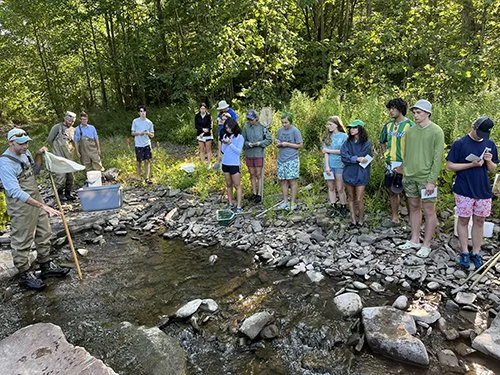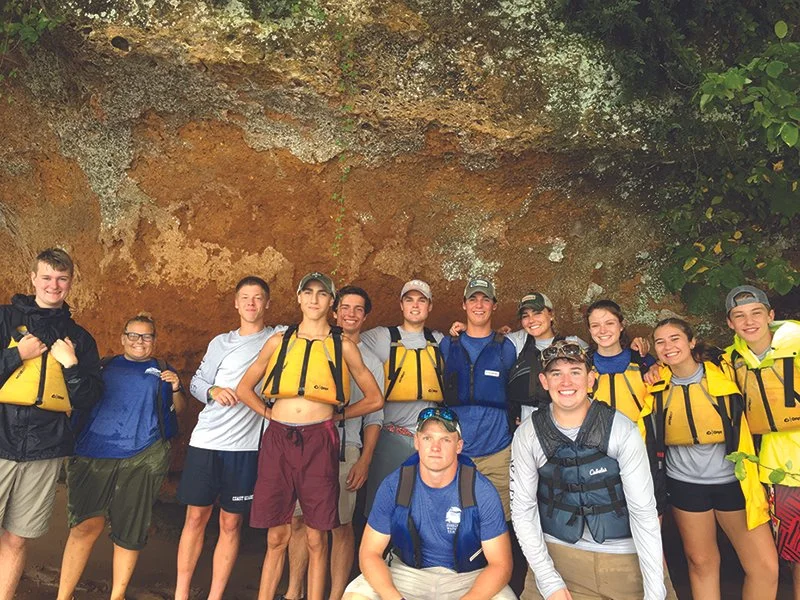
History
Nearly 40 years ago, The Gunston School launched one of the country’s most innovative environmental education programs: Chesapeake Bay Studies. Designed as a week-long experiential learning program for students each May, every Gunston student spends a week of the academic year in the field, studying the ecology, history, culture, and economy of the unique Chesapeake Bay watershed. As a result, every Gunston graduate departs with a month of immersive, experiential environmental learning, and many Gunston alumni are now regional and national sustainability leaders. The Bay Studies program continues today, and now includes a required climate studies course, as well as comparative watershed trips to places like the Amazon, the Grand Canyon, and the Everglades.
In order to build on this innovative environmental education program, in 2014 Gunston’s Board of Trustees set the strategic goal of becoming “a regional and national leader in environmental teaching and learning.” It was through this process that the Chesapeake Watershed Semester (CWS) was born. For years, Gunston students have shared how their place-based and experiential learning through Bay Studies, combined with Gunston’s strong academics, have shaped their worldviews around environmental sustainability. Thus, the goal of creating CWS was to develop a semester-long program combining this experiential and academic learning with a deep focus on environmental science, public policy, and leadership development.
While the CWS program design benefitted from Gunston’s multi-decade experiential learning programming experience in the Chesapeake Bay watershed, we also leaned on institutional partners like The Chesapeake Bay Foundation, Washington College’s Center for Environment and Society, the University of Maryland’s Center for Environmental Science at Horn Point, The University of Pennsylvania’s Wharton School, The Sultana Educational Foundation, and Echo Hill Outdoor School. The program’s design was further enriched by 40 additional institutional relationships, and the CWS Business Plan was developed in partnership with the University of Maryland’s Center for Entrepreneurship Education.
After two years of planning, the first brave cohort of Chesapeake Watershed Semester students launched the pilot program in 2018. Now known as CWS1, these 13 student pioneers dove headfirst into a semester where nearly a third of their time was spent on expeditions and field experiences, ranging from a trip to the Virginia Institute of Marine Science, to seminars with public policy leaders in Annapolis and Washington, to an extended tour of the energy-producing regions of Pennsylvania, to a multi-day stay on the ecologically fragile Tangier Island, where the impacts of sea level rise can be observed first-hand.
At the same time, the rigorous interdisciplinary classroom, lab, and research project work deepened each student's academic foundation, leading to a capstone action project that was publicly presented at the end of the program. While we have made some small adjustments and improvements to both the expedition calendar and the end-of-semester presentation, the expeditions and the capstone project remain core features of the CWS program. In addition, students who have elected to take AP Environmental Science and AP US Government & Politics as part of their coursework have performed exceptionally well on these national exams.
Twice honored with major grants from the Edward E. Ford Foundation, CWS is now considered to be one of the most unique environmental sustainability learning experiences in the country. Each cohort of CWS students emerges as reflective and confident scholars and leaders who can support regional and global environmental sustainability through their understanding of scientific, social, cultural, and political systems.
As we reach the end of the program’s first decade, we look forward to the program’s continued growth and dynamism, and we are confident that program alumni will continue to make a difference in a world that needs their skills and passion.


